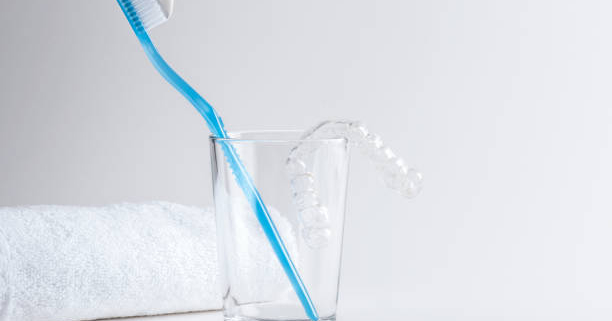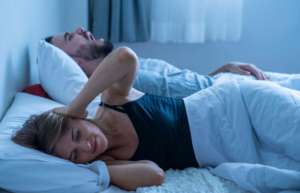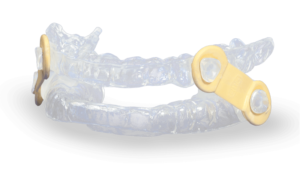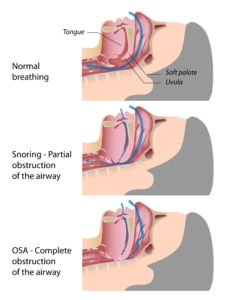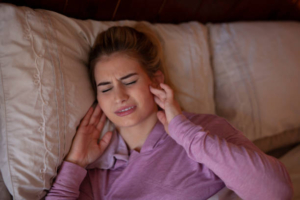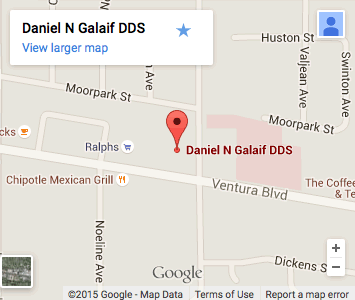Do you know what Sleep Dentistry is?
Most patients think Sleep Dentistry refers to Sedation of patients during complex dental procedures, but it is actually what dentists do to help people who have sleep problems. Dr. Galaif can work with you to help ease sleep apnea and/or snoring symptoms. About 50 to 70 million Americans have ongoing sleep disorders, including about 18 million with sleep apnea.
Dental sleep medicine is an area of dental practice that focuses on the use of oral appliance therapy to treat sleep-disordered breathing, including snoring and sleep apnea. Obstructive sleep apnea (OSA) happens when tissue in the back of the throat collapses and blocks the airway while you’re sleeping, cutting the amount of oxygen delivered throughout the body. As air attempts to pass through this collapsed airway, tissues vibrate and cause you to snore. Sometimes this collapse prohibits airflow so severely that you briefly stop breathing; your body automatically responds and wakes you up, allowing airflow to resume. You may wake up so briefly that you don’t even know it. Snorers also tend to lose sleep, sometimes because their own loud noise rouses them, not to mention their bed partner, who may be bothered (sometimes to a critical point in a relationship) by the noise.
In addition to the nightly annoyance, the pattern of air deprivation and breath resumption known as OSA can also cause more serious complications, including:
- Chronic fatigue
- High blood pressure
- Depression
- Heart failure and other Heart-related issues
There are only 2 products approved by the FDA to eliminate or reduce OSA: An oral appliance or a CPAP machine. Both the oral appliance and CPAP eliminate or reduce sleep apnea by opening the blocked airway in the back of your throat. A CPAP opens the blocked airway by forcing air down your throat through a mask. Consequently, your airway remains open, thus eliminating or reducing sleep apnea. An oral appliance moves the position of the jaw, preventing muscle collapse and keeping the airway open, eliminating or reducing sleep apnea.
Dentists trained in dental sleep medicine use oral appliance therapy to treat sleep-disordered breathing, including snoring and OSA. Oral appliance therapy is a proven, effective treatment for OSA provided by Dr. Galaif – a custom dental appliance we create for you to wear at night while you sleep. These plastic devices pull the jaw forward, which advances the tongue and helps open the airway, cutting down on snoring and the tissue collapse that causes OSA. They’re like night guards and retainers with a top and bottom.
During your first visit, Dr. Galaif will take molds of your teeth and bite, and sends them out to a manufacturer. At the next visit, he’ll adjust the appliance, show you ho
w to put it in, and modify it to make it more comfortable.
For many people with OSA, appliances are a better choice than CPAP (Continuous Positive Airway Pressure) machines prescribed to help nighttime breathing. The bulky masks aren’t for everyone and almost half of people stop using them. Oral appliances are a welcome alternative that people are more likely to use. A 2013 study confirmed that oral appliances can successfully treat apnea cases of all levels of severity.
Look for these other warning signs of sleep apnea, other than snoring and waking:
Weight and Collar Size
Sleep apnea is more often diagnosed in people who are overweight, and may have a large neck; excessive tissue in the throat contributes to less airflow.
Coffee Consumption
Are you constantly drinking coffee because you’re always tired, despite getting to bed early enough? People with sleep apnea may log plenty of hours in bed, but the quality of sleep is so poor they’re always fatigued.
Jaw Pain
If you wake up with jaw pain or soreness, Dr. Galaif can help identify what’s causing this discomfort during your sleep.
Cracked/Worn Teeth
If you have sleep disorder, chances are that you grind your teeth, wearing off the enamel.
According to the Department of Health, 80% of people prefer an appliance over a CPAP. Sleep dentistry caters to a whole range of sleep disorders that can be treated using oral appliances. If you identify with any of the above, you should make an appointment with Dr. Galaif for a consultation as soon as possible.
Call us to make an appointment at (818) 789-6789, or visit the appointment page on our Web site:

